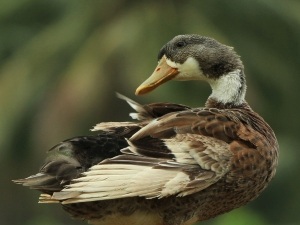
Duck bills are one of the most important parts of the duck, these body parts help the bird eat, preen, and quack, if something happens to your duck’s bill then the bird will be at a huge disadvantage
If you notice something off with your duck’s bill, if black spots suddenly develop on your duck’s bill, you’d be right to be concerned. This article looks into why this may be happening
Table of Contents
Black spots on duck bill:
If your duck’s bill starts developing spots then the reason behind this is likely one of two reasons, melanin or bruising as a result of a fight with another bird. Here is what you need to know about the two:
Melanin:
Ducks, just as with any other animal, have a black or brown pigment called melanin in their bodies
Melanin is responsible for the color of skin, it is what gives the iris of our eyes color as well as darkness in our hair.
Ducks have melanin too, it exists on the bird’s beak and the bird’s feet but is masked by a yellow pigment called xanthophyll.
Xanthophyll is found in a variety of feed ingredients including alfalfa and corn, it is also found in green plants, skin, egg yolks, and fat
If the bird eats enough foods that contain xanthophyll then its bill and feet will remain yellow at all times
However, the duck can lack sufficient xanthophyll to keep its bill yellow.
Eggs need xanthophyll, this pigment is absorbed by the egg yolk. When ducks start to lay eggs the eggs absorb the xanthophyll from the bird’s body removing this pigment from the duck’s bill and feet
If the bird doesn’t eat enough xanthophyll to maintain the bright yellowness of its bill then black spots may develop on the bird’s bill.
What to do:
If your birds have recently started laying eggs, and they’ve also started developing some black spots on their bills, then you can assume that the birds don’t have enough xanthophyll to maintain the yellowness of their bills.
This isn’t something that you’d need to worry about but you can remedy it if you do choose
You can remedy this problem by feeding your bird xanthophyll-rich foods like green plants, corn, alfalfa, and egg yolks.
Make sure to boil and then cut up or scramble the eggs so that the bird doesn’t recognize the eggs as food and eat their own eggs
Bruising:
Ducks may seem mild-mannered but these animals can get into fights with one another and cause bruising
The reasons why your ducks may be fighting each other include asserting their dominance over other ducks, this is usually done to figure out the ranks of the pecking order.
Fighting over mates can also cause bruising, male ducks usually do this, female ducks don’t fight over mates. Bruising can also develop after the bird’s fight over food
The fights can be minor or they can be full-blown battles. These battles can cause bruising on a ducks bill and this may be the black spots that you are seeing
What to do:
If the birds are fighting as a way of asserting dominance and figuring out who ranks where in the pecking order then you can’t do anything about it.
The birds need to rank each other themselves and human intervention won’t do anything. You can however isolate and help heal a bird if it becomes injured and starts bleeding.
If the reason behind the fighting is a mate, and two males are fighting to see who is dominant over the other and who gets the chance to mate, then you shouldn’t step in.
This is natural selection and it is advised that you let the birds see who is more dominant.
You can however stop the fighting if it has to do with a lack of food. Animals will go as far as killing each other over food. You can remedy this situation by ensuring that you serve enough food so that all the birds can eat their fill.
As long as the bruising does not cause health problems in the birds then the ducks will be fine. The spots are likely nothing to worry about
Just make sure to keep an eye on the duck’s beak making sure that the spots don’t cause any type of problems for the duck
If the bird seems like the spots are causing some sort of problem, if the bird seems distressed in any way, then you would need to take the bird to the vet for an assessment and diagnosis and maybe treatment
FAQ:
Why are there spots on my duck?
If you find that there are black spots on your duck’s skin, bill, or legs then this is simply melanin skin pigment. This pigment is not harmful to your ducks.
However, in other cases, the black spots can indicate a fungal infection in your pet
What does a sick duck look like?
Sicknesses can cause a variety of symptoms in your duck including ruffled feathers, a loss of appetite, diarrhea, blood-stained feathers around their vent, sluggishness, blood dripping from their nostrils, sudden docile behavior, refusal to eat or drink, puffed-up cheeks, seizures, dehydration, lethargy, and vomiting.
If you enjoyed this article then you may also be interested in other chicken related articles. Here are some articles that you may be interested in: Pigeon-Toed Duck, Bow-Legged Duckling, Beak Rot In Ducks, Callus On Duck’s Foot, Black Spot On Duck Foot

